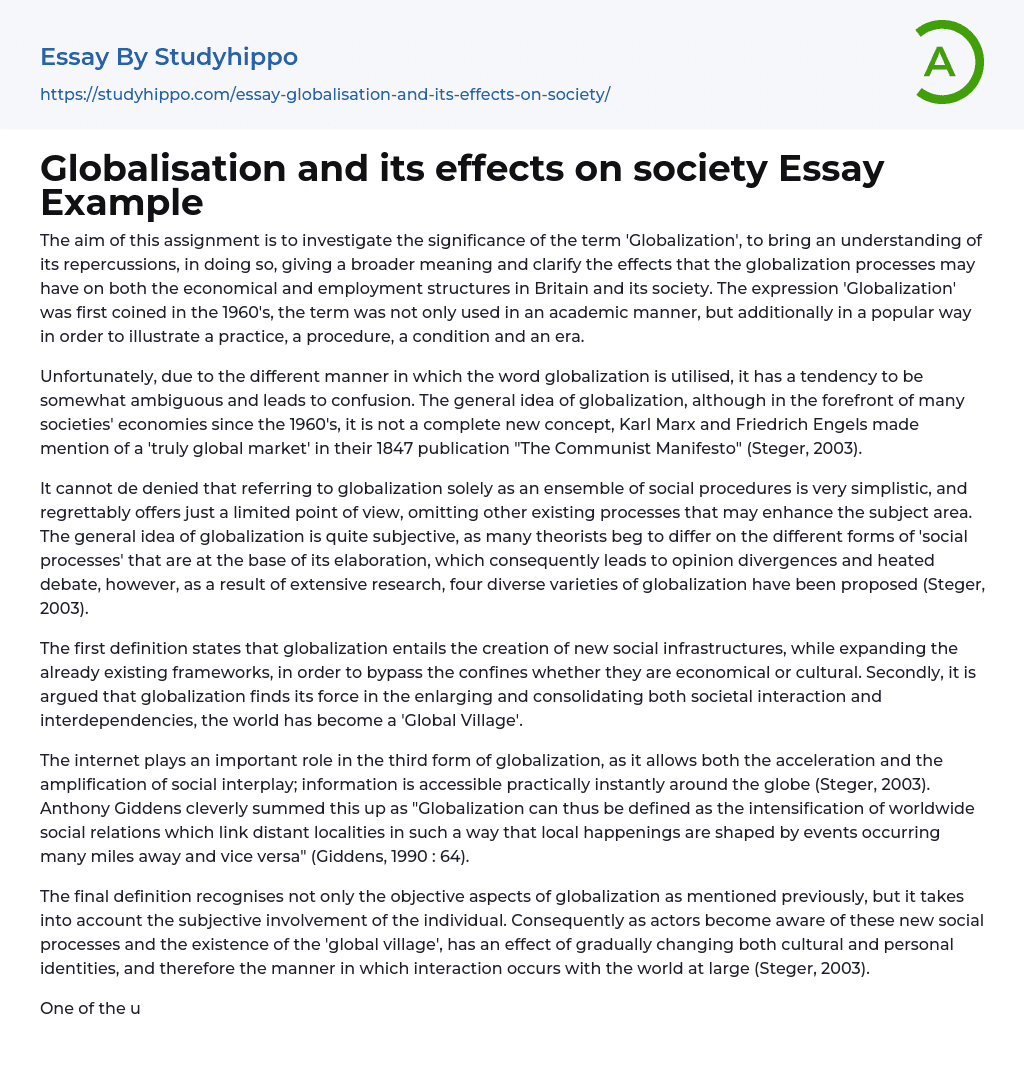This task's goal is to dive deep into the significance of the word 'Globalization' and understand its implications. The purpose here is to offer a wider comprehension and shed light on how globalization can influence Britain's economic landscape, employment patterns, and societal fabric. Initially utilized in the 1960s, not just in scholarly conversations but in common dialogues too, the term 'Globalization' was employed to depict a practice, process, state or period.
Unfortunately, the concept of globalization is often used in ways that can be confusing due to its various interpretations. Despite being a significant factor in many economies since the 1960s, it's not an entirely new notion. In fact, Karl Marx and Friedrich Engels hinted at the concept of a "truly global market" in their 1847 publication "The Communist Manifesto" (Steger, 2003).
It's certain that viewing globalization only as a collection of social processes is restrictive
...and unfortunately provides a limited perspective, neglecting other mechanisms that could contribute to the subject. The interpretation of globalization is personal, as various theorists have differing opinions on the myriad types of social procedures facilitating its evolution. These varying perspectives can lead to diverse views and heated debates. However, extensive research has suggested four distinct forms of globalization (Steger, 2003).
Per the initial elucidation, globalization signifies the evolution of fresh societal infrastructures and broadening of current ones to conquer economic and cultural constraints. It is also proposed that globalization is fueled by escalated social engagement and interconnectedness, which results in the world transforming into a "Global Village".
The internet is crucial in the third type of globalization because it enables rapid and widespread social interaction. It allows for instant access to informatio
on a global scale (Steger, 2003). Anthony Giddens succinctly described this as "Globalization can thus be defined as the intensification of worldwide social relations which link distant localities in such a way that local happenings are shaped by events occurring many miles away and vice versa" (Giddens, 1990: 64).
The final definition acknowledges not only the objective aspects of globalization mentioned earlier but also incorporates the subjective involvement of the individual. As a result, when individuals become aware of these new social processes and the existence of the 'global village', it gradually alters both cultural and personal identities, as well as the way in which interaction takes place with the world at large (Steger, 2003).
The promotion of 'Free Trade' is a key aspect of globalization within capitalist societies. The goal is to maximize profits while minimizing production costs. This concept has allowed Transnational Corporations (TNCs) to relocate their production and industries to locations with lower human and technical costs.
The authorities assert that this form of manufacturing is advantageous in providing jobs for emerging economies and manufacturing goods at a reduced price for customers. Nonetheless, it's crucial to recognize that global capitalism doesn't always yield positive outcomes. Industries in the UK such as steel, shipbuilding, and textile have been profoundly affected due to this shift, leading to considerable implications on both the economy and employment sector (Marsh and Keating, 1996).
The rise of globalization and the ensuing competition has resulted in employment decline in Britain and Western Europe. Numerous factories are unable to compete as more affordable products are manufactured elsewhere around the globe (Frieden, 2007).
The 'Dr Martens' shoe manufacturing shift to Guangdong, China was motivated
by the need to increase profit margins. Consequently, workers in China receive much lower salaries than their Nottingham peers, causing a job loss of about a thousand people. Similarly, B and Q, renowned for its DIY stores, relocated the production of approximately one billion pounds worth of electronic equipment and garden furniture from the UK to Guangdong.
The UK is the most significant financial contributor from Europe to China, bolstering the Chinese economy while potentially undermining its own. Every pound directed towards China or any other country decreases the potential for investment within Britain (Marsh and Keating, 1996). A critical review of this essay and its main points indicates that globalization is a contentious subject. People's views on it can vary widely, either in favor or opposition, based on their personal circumstances.
International competition has undeniably brought about benefits like enhanced living standards and improved opportunities for life to numerous underdeveloped and third world nations. Yet, it's important to recognize that this situation has also led to joblessness and unstable circumstances for several people. The unceasing quest for profit in global capitalism often neglects the significance of an individual.
- Culture essays
- Social Control essays
- Citizenship essays
- Social Justice essays
- Caste System essays
- Social Responsibility essays
- Socialization essays
- Deviance essays
- Modern Society essays
- Popularity essays
- Civil Society essays
- Community essays
- Female essays
- Filipino People essays
- Igbo People essays
- Indigenous Australians essays
- Indigenous Peoples essays
- Minority Group essays
- Social Institution essays
- Men essays
- The nation essays
- Middle Class essays
- Social Norms essays
- Discourse Community essays
- Popular Culture essays
- Car Culture essays
- American Culture essays
- Mormon essays
- Indian Culture essays
- Mexican Culture essays
- Pop Culture essays
- Cultural Differences essays
- Culture Shock essays
- Different Cultures essays
- American Dream essays
- Barriers To Entry essays
- Capitalism essays
- Central Bank essays
- Compensation essays
- Consumerism essays
- Economic Development essays
- Economic Growth essays
- Economic Inequality essays
- Economic System essays
- Economy essays
- Employment essays
- Export essays
- Finance essays
- Free Trade essays
- Gross Domestic Product essays




